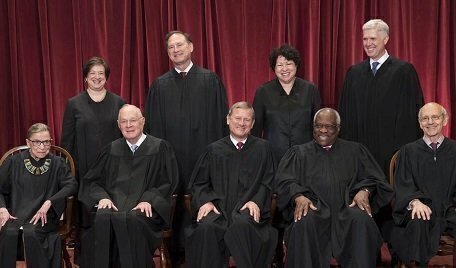With the controversy over young undocumented immigrants unfolding both in Congress and the federal courts, the Supreme Court agreed on Tuesday to put the case before it on a fast track. That may indicate that the Justices could be prepared to rule during their current term – unless Congress comes up first with a new law sorting everything out in the program known as Deferred Action for Childhood Arrivals (“DACA” for short).
 Given the pervasive uncertainty that was evident in Congress over the past week, the only thing that is reasonably assured is that the lawmakers have put off their budget dispute, with the fate of DACA caught up in that, until February 8. What may happen legislatively after that is in deep doubt.
Given the pervasive uncertainty that was evident in Congress over the past week, the only thing that is reasonably assured is that the lawmakers have put off their budget dispute, with the fate of DACA caught up in that, until February 8. What may happen legislatively after that is in deep doubt.
That day is one day after the legal briefs will have been filed at the Supreme Court, focusing on the preliminary question of whether the Justices will agree to grant review of the Trump Administration appeal, and whether – if they do take on the case – they will move toward a final ruling to emerge before the end of June.
In the meantime, nearly 700,000 young adults – all of whom were brought illegally into the U.S. as children by their parents, and are growing up as “dreamers” of a long-term future in America – will have to watch both Congress and the Supreme Court to see what their near-term fate might be.
As of Tuesday, here is where the controversy stands in the courts: the Trump Administration has decided that the DACA program (started five years ago in the Obama Administration) should end as of March 5 of this year, but a federal judge in San Francisco has put that deadline on hold while the federal courts review whether it would be legal to end the program, and that judge’s ruling is at the center of the case before the Justices in an appeal by the Administration.
The Administration has asked that the Justices, in their next scheduled private conference on February 16, agree to an unusual procedure in which the Supreme Court would directly review the San Francisco judge’s ruling, bypassing a federal appeals court in the process, and the review would be completed before the Court’s term ends by late June.
All that the Justices agreed to do on Tuesday was to put the government’s case on an “expedited” basis, with the “dreamers” and others challenging the plan to end DACA to answer by February 2 the government plea to review the decision by District Judge William Alsup of San Francisco.
The government has vowed to file by February 7 its last brief on the issue of whether review is to be granted.
That timetable will make it possible for the Justices to consider on February 16 what they are going to do with the case. If they vote then to grant review, and agree to finish that in the current term, they would then lay out a faster-than-usual timetable for further written briefs and a public hearing. If review is granted, a hearing would probably be held in April, because the Justices strongly favor finishing all of their hearings by the end of April in any given term. They prefer to keep the final two months of a term open for completing the writing of their decisions.
At this point, it would only be speculation to suggest that the Court is going to review and decide the case, but it is unusual for the federal government to take an important case to the Court and be turned away completely. Everyone on all sides of the case agrees that it is important, although the challengers to DACA have argued that there is no need for the Justices to take on the case now and that the case should play out in the lower courts first.
If Congress, in the meantime, comes up with a more-or-less permanent solution in favor of the “dreamers,” the Court would step aside – unless such a solution itself raised new constitutional questions.
If the case is left to the lower courts, Judge Alsup has vowed to finish a ruling on the legality of shutting down DACA so that the judicial process could be completed before the March 5 scheduled end date for the program. But if the Justices do agree to review the case, Judge Alsup would stand aside if he has not finished a decision by the day the Court did grant review.
The government has not asked the Justices to put the case in Judge Alsup’s court on hold while it pursues the appeal to the Supreme Court, but a grant of review by the Justices would take it out of the lower courts’ reach.
The number of legal complexities and political disagreements surrounding DACA was why the “dreamers” and their supporters had wanted Congress to come up with a solution before March 5. But no commitment to do that was made in Congress when, on Monday, the lawmakers ended a budget standoff that had shut down the government for the weekend and kept DACA in limbo.







